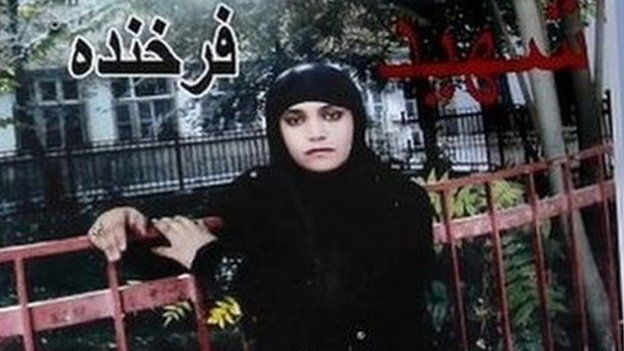Four sentenced to death over Afghan mob killing
- Published

Four Afghan men have been sentenced to death over the mob killing of a woman in Kabul in March.
The 28-year-old woman called Farkhunda was beaten to death after being accused of burning a copy of the Koran, although witnesses say she did not.
It took just four days for the verdicts to be reached. Eight men were sentenced to 16 years in prison and 18 others found not guilty.
The incident led to widespread protests against the treatment of women.
A decision in the case of 19 policemen accused of failing in their duty to prevent the attack is expected on Sunday.
Farkhunda's brother told the BBC that the family were not satisfied with the verdict and that all of the main defendants should be put to death.
Farkhunda was speaking for a more orthodox Islam, David Loyn reports (Report from March 2015)
Farkhunda had argued with an amulet seller about his practice of peddling charms to women at the well-known Shah-Du-Shamshaira shrine, which is within walking distance of the presidential palace and Kabul's main bazaar.
The amulet seller is one of those sentenced to death on Wednesday.
In the course of the argument Farkhunda was accused of burning the Koran and a crowd overheard and attacked her.
In confession statements read in court, some of the accused admitted they had been drawn in by the claims. An official investigator has said there is no evidence she burned the Koran.
Analysis: Waheed Massoud, Editor, Afghan service, Kabul
There have been mixed reactions among the Afghan public following the court's decision.
Some have welcomed it and say Farkhunda's family have finally been given justice.
However, the Afghan judicial system is widely seen as corrupt and many others have criticised the court's proceedings.
Kangaroo courts are common across the country, especially in areas where the government does not have full control and where tribal elders and local strongmen act as a self-appointed judiciary.
Even in the cities where people can resort to the courts, cases can face long delays and corruption is chronic. The police force is more focused on fighting an insurgency than upholding the rule of law.
The trial today may provide some justice for Farkhunda but it does not reflect the reality of efforts to counter crime and violence across Afghanistan.
Violence against women, and violence in general, are common in a country that has been at war for over three decades.
But even against that backdrop, the attack on Farkhunda on 19 March shocked many Afghans, taking place as it did in the heart of the capital and under the eyes of the police.
Farkhunda was beaten to death before her body was driven over by a car, dragged through the streets and then set on fire.
Some of the attackers recorded the brutal killing on their cell phones and footage was later uploaded to social media sites, including some that appeared to show a policeman taking part in the attack and pushing Farkhunda onto a roof.
Correspondents say that had it not been for the videos and the nature of the incident, it would have gone unnoticed like hundreds of similar cases, especially in rural areas, many of which never make it to court at all.
The case is not the first where the justice system has rapidly handed down death sentences for a high-profile crime - in October five men were hanged for a gang rape in Paghman district.
In that case, as in the current trial, there were concerns from rights activists over the speed and fairness of the convictions.
- Published26 April 2015
- Published26 March 2015